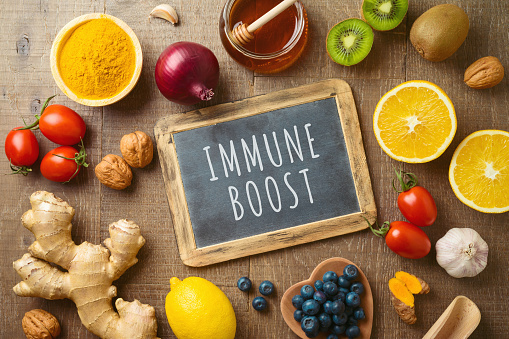The immune system is the body’s natural defense against disease and infection. It’s a complex network of cells, tissues, and organs that work together to protect the body from harmful pathogens like bacteria, viruses, and fungi. When the immune system is working properly, it can identify and eliminate these pathogens before they cause harm. However, sometimes the immune system can become weakened or compromised, leaving the body vulnerable to infection.
- Fortunately, there are many natural ways to boost the immune system and keep it strong. One of the best ways to support immune function is to eat a healthy diet. A diet rich in fruits, vegetables, whole grains, lean protein, and healthy fats can provide the nutrients the immune system needs to function properly. On the other hand, a diet high in processed foods added sugars, and saturated fats can weaken the immune system and increase the risk of infection.
2. Getting enough sleep is also essential for immune function. During sleep, the body produces cytokines, which are proteins that help fight infection and inflammation. Lack of sleep can impair the production of cytokines, leaving the body more vulnerable to infection. Aim for 7-8 hours of sleep per night to support your body’s natural healing processes.
3. Regular exercise can also help boost immune function by increasing circulation and reducing stress. Aim for at least 30 minutes of moderate exercise per day, such as brisk walking, cycling, or swimming. Additionally, stress can weaken the immune system, so it’s important to practice stress-reducing techniques such as meditation, yoga, or deep breathing exercises.

4. Staying hydrated is also important for immune function. Drinking plenty of water can help flush toxins out of the body and keep cells hydrated and healthy. Aim for at least 8-10 cups of water per day, and avoid sugary drinks or excessive caffeine.
5. Smoking can weaken the immune system and increase the risk of infection, so quitting smoking is an important step in supporting immune function. Excessive alcohol consumption can also weaken the immune system, so it’s important to limit your intake to one or two drinks per day.
6. Some supplements, such as vitamin C, vitamin D, and zinc, may help boost immune function. However, it’s important to talk to your healthcare provider before starting any new supplements, as some can interact with medications or cause adverse effects.
7. Vaccines are another effective way to protect against infectious diseases and boost immune function. Vaccines work by stimulating the immune system to produce antibodies, which can then recognize and destroy the pathogen if it enters the body. Getting vaccinated is important not just for individual health, but also for community health, as it can help prevent the spread of infectious diseases.
8. Finally, practicing good hygiene can help prevent the spread of infectious diseases and support immune function. This includes washing your hands frequently with soap and water, avoiding close contact with sick individuals, and covering your mouth and nose when coughing or sneezing.
In conclusion, there are many natural ways to boost immune function and keep the body strong and healthy. By following these top 10 tips, individuals can support their immune systems and reduce their risk of infection and disease. However, it’s important to remember that the immune system is complex, and individual health needs may vary. Consult with a healthcare provider before making any significant changes to diet or lifestyle.